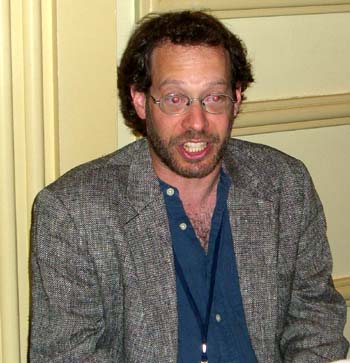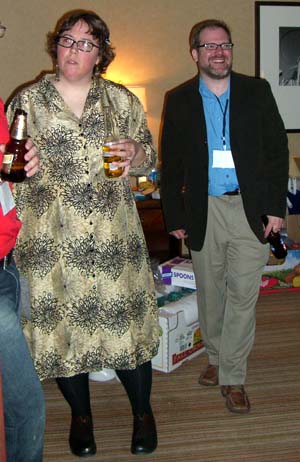Panelists: David Coe, Robin Hobb, Tamara Siler Jones, Jane Lindskold (moderator), Kelly Link
Synopsis from the program book: Panelists discuss how the urban/modern world works as a backdrop to modern fantasy/dark fantasy. Where do we find "The Dark Woods" in the urban world, and what lies within? How much is left to explore in urban fantasy?
So, where do the panelists find an inspiration for urban fantasy in modern backdrops? Where does the mystery lie in the modern world? You could easily guess what source of inspiration was mentioned most often: old houses. Were these panelists refugees from the Fantasy Cliches panel? :-) (The latter, by the way, was quite funny and one of the most worthwhile panels at the WFC. I think it deserves a longer and more detailed report than my reports have been so far, and it will be forthcoming next week.)
Jane Lindskold. "I am fascinated by old spaces. For me to see the wires, the pipes, in a building, it's to see like your own hand cut open. It ties with what you (another panelist) said about "organic", only it's mechanical organic. I live in the most mundane ranch house, there are millions of them, and I can't believe how many secret compartments there are. Plus, remnants of a tear gas alarm system, and a couple of other strange things. [When we travel, we stick things we don't want other people to find, in them.]"
Other than old houses, where else?
Robin Hobb. You can take any fantasy setting and bring it into modern time. Why does once upon a time should be long, along ago? Why not yesterday? [You have to ask yourself:] who are the wizards in our cities? [and you'll get] a million ideas for stories.
David Coe. My character access to magic [in my urban fantasy] is through a hallucinogenic addictive drug that destroyed his father's mind and is now destroying his own. It's a journey to a mind of a drug addict. To me, the most fascinating dark woods are in the human mind, not in a fantasy or urban fantasy setting.
David Coe. More pictures from the World Fantasy Convention 2006 can be found in my my series of blog posts on WFC 2006.
Moderator Jane Lindskold asks an interesting question. I was thinking about an interesting thing you might encounter when putting a story in play in the modern setting. How do things like guns, cell phones, cameras change [how you handle the mythic material?] For example, there are security cameras in grocery stores all over the place, [which makes it impossible for the mythical creatures like elves and fairies to pass unnoticed through a modern urban setting]. Or would you ignore those issues and hope that the readers do too?
Robin Hobb. It's almost more fun when you have very modern trappings to set things off, because then what is strange and archaic becomes even more strange and archaic. When you stay in a hotel, who are you tipping, is it really the hotel maid? (Did she mean that maybe the maid's work is done by little elves, or...? -- E.) What do the wizards do day-to-day in the city? They had to adapt, just like we had to adapt, to cars and cellphones.
Jane Lindskold answers her own question with this example from her experience [?]. "One of the first short stories I sold was a fantasy, but it came from a classic SFnal what if: what if you had a dog that had a transfusion of werewolf blood? It was alled "Good boy". A friend vet said that when they had a call of a dog hit by a car, they would call the local pound and get a large dog for a blood infusion. In my story, the pound happens to have a great big dog, and then a German shepherd gets a tranfusion of werewolf blood, and turns into a little boy when the moon turns full.
[To me one of great joys in urban fantasy is to think, what if all that stuff was real and crossed over to the modern world?]"
One of the more interesting moments came when a guy in the audience asked a question: "Why in the urban fantasy when you meet fairies, they are still in the middle ages? Why have they not evolved into modernity along with the humans?" The panelists are apparently well-versed in fairy'ology, because they are having a completely straight-faced discussion that goes like this:
Kelly Link. "One, fairies are allergic to iron, which makes building things complicated. Another reason is, that while it's not a parasitical relationship, but those people who live adjacent to us are not fond of our technology. Traditional fairies don't make things. They steal things from people."
Kelly Link. More pictures from the World Fantasy Convention 2006 can be found in my my series of blog posts on WFC 2006.
Jane Lindskold. "Time flows differently in the fairlyand. So it would take them a very long time to catch up with our world."
A guy from the audience. And their magic may eliminate a need for technology.






No comments:
Post a Comment